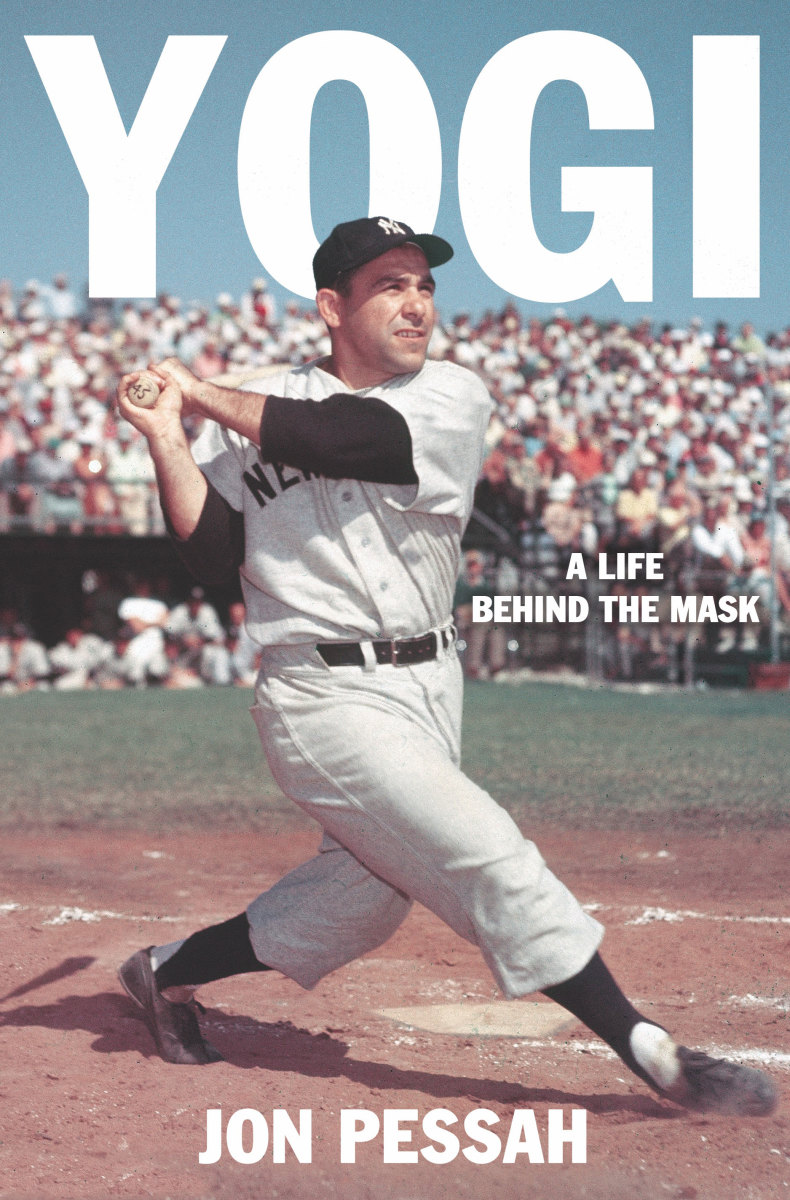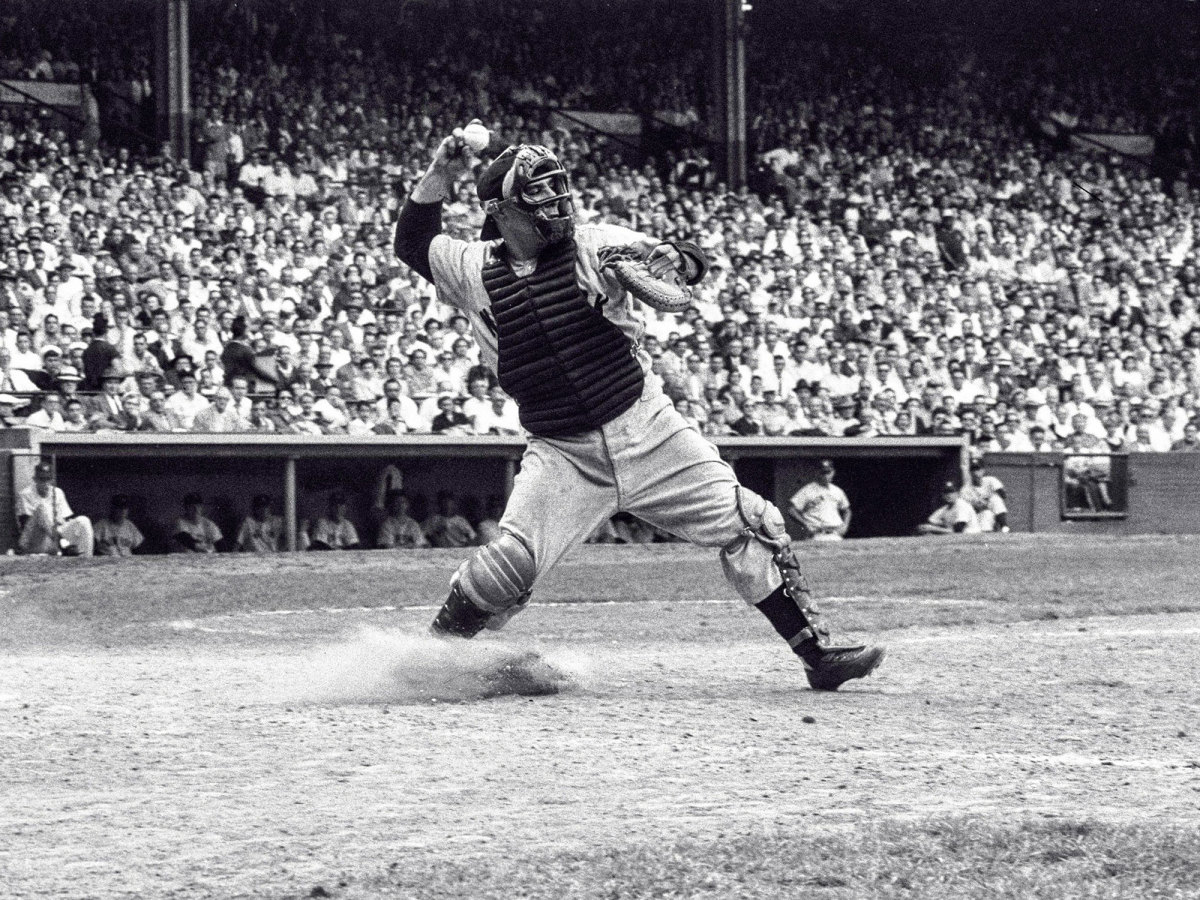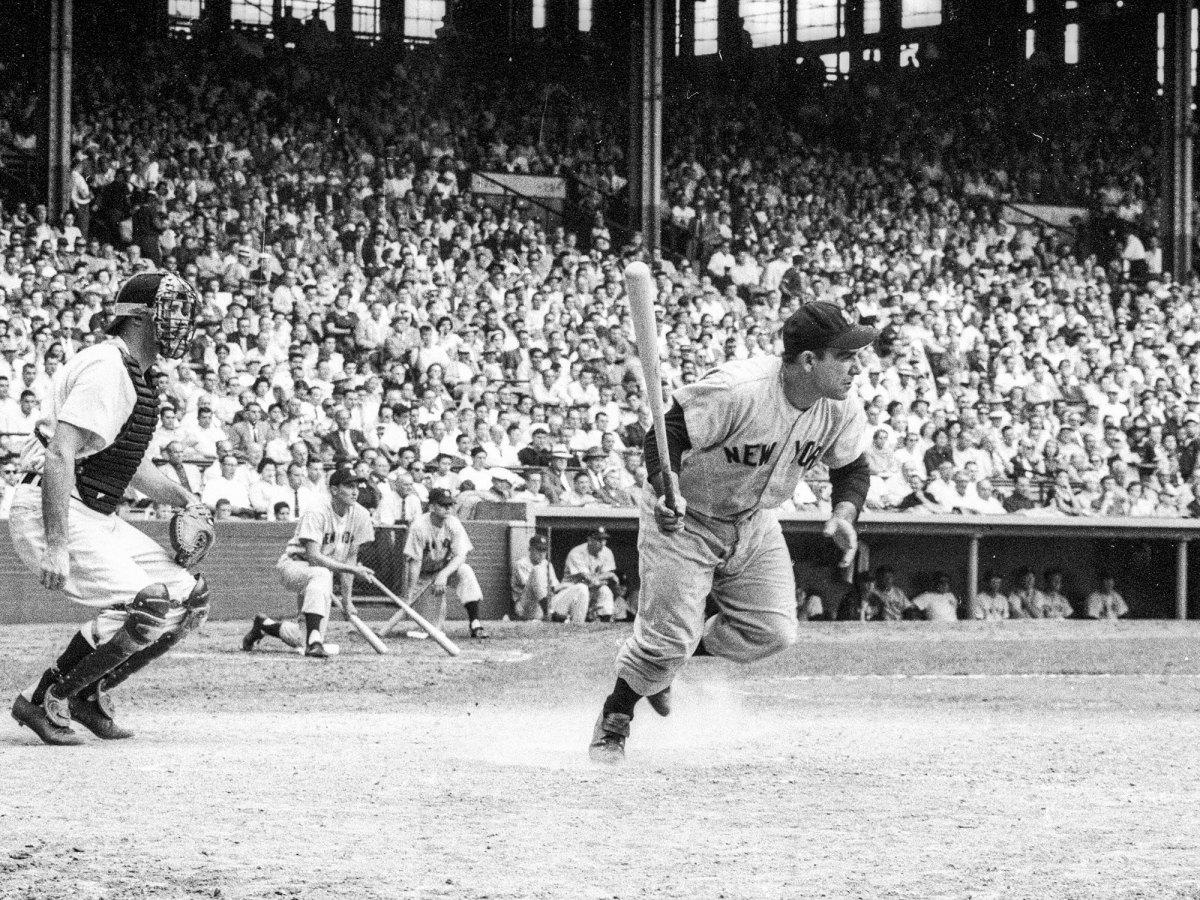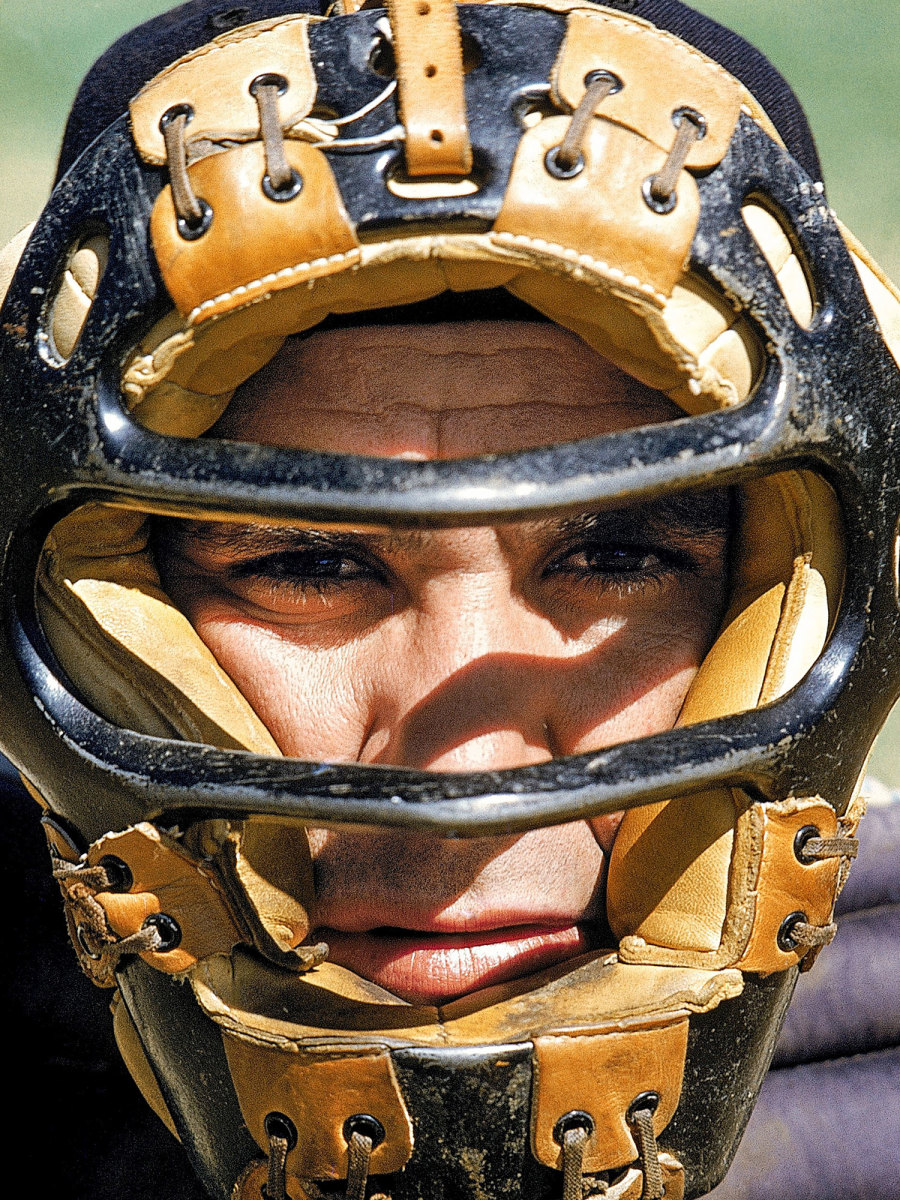Yogi Berra Could Have Been a Cardinal for $500. They Said No
Excerpted from YOGI: A Life Behind the Mask. Copyright (c) 2020 by Jon Pessah. Available from Little, Brown and Company, an imprint of Hachette Book Group, Inc.
It’s another hot and humid St. Louis summer in July 1941. But that’s not what 16-year-old Lawdie Berra is thinking about right now. He’s sitting in the back seat of Cardinal General Manager Branch Rickey’s big black Lincoln on his way to Forest Park with his friend Joe Garagiola up front and some kid named Schoendienst fidgeting in the seat next to him. Poor guy is covered with angry red bites all over his arms and neck. Lawdie heard someone call him Red at the tryout camp in Sportsman’s Park just a few minutes ago, but these bites can’t be the reason.
Lawdie saw right away that Schoendienst can hit — from both sides of the plate — smacking line drives to all fields when it was his turn at bat. And he wasn’t bad at shortstop, either, though the Cardinal scouts kept asking him to shift over to second base. Albert, that’s his first name. Albert Schoendienst.
Schoendienst is one of the many out-of-town boys who saw the same Cardinal advertisement for an open tryout at Sportsman’s Park in the newspaper that also caught the attention of Lawdie and Joey. Anyone who wasn’t the property of a major league team was invited to try out for the Cardinals’ minor league system. Damn, there must have been 400, maybe 500 boys who showed up yesterday, chasing the dream of playing baseball in the major leagues.

That was far too many to judge in one afternoon, so Rickey told all the St. Louis kids to go home and come back the following day. The Cardinal GM wanted to see what the out-of-town kids could do first.
Red is one of a few boys Rickey told to come back. He’d hitched a ride from Germantown, about 39 miles away in neighboring Illinois, and had reached St. Louis in the back of a milk truck. Since he didn’t have any money, a secretary in Cardinal owner Sam Breadon’s office gave him 25 cents, which he was going to use for food until his plan to sleep in the park ended with a heavy rain. So he spent five cents for a room in a fleabag hotel and woke up covered with bedbug bites.
But Schoendienst had another good performance today, and that’s why he’s sitting in Rickey’s car now, on his way for a third tryout, this one with just seven other boys.
Garagiola already looks the part of a baseball star. Still only 15, he moved easily from catcher to first base to the outfield in today’s tryout, performing well in each position. They didn’t give any of the boys too much time to hit, but Joey showed a smooth left-handed swing that had the scouts nodding their heads.
None of the baseball men really knew what to make of the kid who came with Garagiola. Squat and thick, Berra didn’t look anything like a baseball player—until he took the field. Berra showed surprising quickness behind the plate and equally surprising speed in the outfield. He also showed off his powerful right arm, though accuracy was clearly not his strong suit.
But it’s when he came to the plate that the scouts truly took notice. Berra swung a big bat with his unusually long arms, almost attacking the ball more than swinging at it. And he attacked almost every pitch thrown his way — high or low, a strike or a ball — and hit it hard. The crack of the bat on ball shouted real power.
And that’s why Rickey told his scouts to get Berra in his car along with Garagiola and Schoendienst. Like every Cardinal fan in St. Louis, the three boys all know the baseball legend’s story. Rickey was a mediocre catcher for the Browns and New York Highlanders—he hit .239 in 120 games spread over four seasons before quitting in 1914—and was an average manager. But he all but invented the minor league system when he became the Cardinal GM, and now every team in baseball is playing catch-up. It’s Rickey who built the pedestrian St. Louis franchise into a perennial contender, winning five National League pennants and three World Series since 1926.
Quite simply, there’s no better judge of talent than the Great Mahatma, as the writers like to call him. Rickey has the uncanny ability to look at a young player and project how big, strong, and fast he’ll be when he matures into a man — something even the best scouts can’t do on a consistent basis. Even better, he has a knack for knowing which players will be average major leaguers, which boys will be good, and which boys could be great.
Once Rickey reaches the ball fields at Forest Park, the boys take turns hitting and pitching while the Cardinal GM and his scouts watch and take notes. Garagiola performs well. So does Schoendienst — who will go on to a Hall of Fame career as a second baseman for the Cardinals, Giants, and Braves. Both show good plate discipline and strike the ball with authority. They are clearly talented.
Schoendienst takes the mound when it’s Berra’s turn to hit. At 18, Schoendienst is older than most of the boys here and has a good, live arm, but he simply can’t get a ball past Berra. As always, Lawdie goes after just about every pitch, and the results are the same as they were in Sportsman’s Park—one ball after another rocketing deep into the outfield. The sound of his bat hitting the ball is unlike that of any of the other seven players. And when Schoendienst is told to stop pitching, he’s convinced the odd-looking kid at the plate is the best hitter he’s seen all day. Maybe any day.
Berra knows he performed well, which makes the events of the next few days so perplexing. The Cardinals offer Garagiola a contract and a $500 bonus—not a penny less, the young player says, because that’s what Pop needs to pay off his mortgage. Joey is not yet 16, so Giovanni signs the contract for him. The deal: Joey will take a paying job as a groundskeeper this summer in Springfield, Missouri, 215 miles away, then play for the Class C minor league team next season, when he is 16. In essence, the Cards are hiding Joey in Springfield so no other team can lure him away.
The Cardinals are not nearly as interested in Berra. Their first offer is a contract with no bonus—not a single dollar—and Lawdie is stunned, then immediately rejects it. He knows once his father hears about Joey’s bonus, Pietro will be convinced he’s been right all along—playing baseball is a complete waste of his son’s time. He’ll tell Lawdie it’s time to find a real job and keep it, and that will be it for baseball.

And that’s still how Berra feels when the Cardinals come back and offer him a $250 bonus. “Son, what I’m going to say to you is for your own good,” Rickey tells him. “I don’t think you are going to make it to the majors. You’ll be a minor leaguer, no more than Triple-A. We’re looking for players who can go all the way.”
That hurt, badly, especially coming from Rickey. Berra is happy for his best friend but bewildered by Rickey’s indifference toward him. Whenever they play, Joey bats third and Lawdie bats fourth, the spot reserved for the team’s most powerful hitter. All the kids say Lawdie is the better player—even Joey says it. Why couldn’t Rickey see what everyone else sees?
Jack Maguire sees it. A part-time Cardinal scout, Maguire welcomed Berra onto his American Legion team a few weeks back and is already convinced the kid is going to be a star. So Maguire works hard to change Rickey’s mind over the next few days. He insists Berra will turn out to be a better player than Garagiola and begs Rickey to spend just $250 more to find out.
Absolutely not, Rickey says.
“It’s $250, and he’s not worth a dollar more,” he bellows at his scout. There’s no way he can accept the Cardinals offer, Berra tells his coach. “I’m happy the Cardinals like Joey,” Berra says to Maguire, “but I don’t understand why they aren’t interested in me. Thanks for everything Mr. Maguire, but I want the same as Joey is getting. Tell Mr. Rickey my answer is still no.”
Maguire has one more idea. His friend Lou McQuillen is a scout for the Browns, and the American League doormat can certainly use a hard-hitting prospect like Lawdie. But McQuillen’s pitch to his bosses is brushed aside. If the Cardinals didn’t sign Berra, the Browns management reasoned, how good could he be? We’ll offer him a contract, a disappointed McQuillen tells Maguire, but there’s no bonus. Maguire knows what Berra’s answer is even before he relays the news.
All Lawdie can do is thank Maguire again and wonder about his future. For the first time since he was old enough to dream of becoming a baseball player, he has doubts. Big doubts. Indeed, it’s like someone just ripped out the underpinning of his positive outlook on life. He’s used to the other boys making fun of the way he looks and the way he talks, but he’s always been able to silence their taunts by outplaying them on the ball field. Now the most renowned executive in all of baseball is telling him he’s not good enough. Even the lowly Browns aren’t interested!
Berra knows his parents are not going to be happy with this development, especially since the news across the street is so dramatically different. Sure enough, his parents call another family meeting to determine what the future holds for their youngest son. And as the day of the meeting approaches, Lawdie can’t help but wonder if his days of playing baseball are rapidly coming to an end.
***
Once again, Lawdie Berra finds himself sitting with his arms folded at a meeting in his parents’ kitchen with his dream of playing major league baseball hanging in the balance. Father Charles Koester, the popular young priest from St. Ambrose Church, is here. So is Joe Causino, the director of the South Side YMCA all the kids call Uncle Joe. Lawdie and his friends hitch two miles to play ball at Uncle Joe’s Y and swim in one of the area’s few indoor pools.
Tony and Mike are here, too. They might not agree with their father’s dim view of baseball, but their patience with their little brother is beginning to run thin. Lawdie is now 16; by this age both brothers were holding down full-time jobs and playing ball when they could find the time—not the other way around.
“Respectable men do not play games for a living!” Pietro keeps repeating as the meeting gets under way. And this time there is no pushback from Tony and Mike.
Pietro doesn’t know who Branch Rickey is, but Father Koester does, and he knows what Rickey’s words mean for Lawdie. Father Koester is a big Browns fan, and all the boys love it when his Sunday school lessons turn into long talks about baseball. The priest knows Lawdie is a fine ballplayer, but maybe Lawdie’s just not good enough.

“Baseball is a good thing, a fine thing,” Father Koester tells Lawdie, “but in moderation. What you are doing is beyond all reason. No wonder your good father and mother are afraid you’re going to turn into a bad boy.”
A bad boy.
Those are words no parents on The Hill want to hear. They all acknowledge there is a small but well-known criminal element living among them, and everyone on Berra’s block of Elizabeth Avenue knows the trouble they cause firsthand. A few years back, Charles Garavaglia—whose wife Ann gives Paulina insulin shots for her diabetes—was running a successful food store on The Hill when a gang of young men told him he should buy insurance from them. Garavaglia refused, and one morning he found his store burned to the ground.
If Lawdie’s parents told Father Koester they’re worried their youngest son might become a bad boy, this meeting is a lot more serious than he imagined.
And it doesn’t help that Lawdie continues to lose one job after another. Uncle Joe was the first to set up Lawdie with employment, getting him a job as a shipping clerk with an old friend. But Causino got a call from his friend that very first afternoon. Seems the young lad Joe brought to him had gone missing.
“What happened?” Causino asked.
“Well,” his friend said, “he worked like a beaver all morning. Then about noon he looked out the window. It was a wonderful day. He said, ‘I’m sorry, mister, I’m quitting. But thanks for the opportunity.’ Then he opened a package I thought was lunch. But it wasn’t his lunch. It was a baseball glove.”
Lawdie next found work in a coal yard, working in the area that pressed and stamped coal dust into bricks that people on The Hill used to fire up their stoves to cook their food and heat their homes. Lawdie wrapped the bricks with brown paper, a job that left him covered in dust by day’s end. He could make as much as $25 a week—all of which went to Momma, who gave him an allowance of a dollar or two, a small fortune for a kid used to getting 15 cents a week.
Lawdie hated being covered in dirt, but he liked having money for Superman comic books, candy, soft drinks, and movies—especially westerns. But when winter turned to spring, he once again answered the call of the ball fields, and that position disappeared, too. Pietro found him another job working on a Pepsi truck, but he lost that one as well, just as he lost the good-paying position Mike found for him at the shoe factory. Could that be why Father Koester said his parents are worried he would turn out bad?
Lawdie let everyone in the room talk, not saying a word as one after another delivered the same message: he’s 16, and it’s time for him to grow up. But now the moment has come for him to respond. He sought out Causino to make his case for what might just be his last chance.
“Uncle Joe, you always told us that the thing a man is most interested in is what he ought to spend his life doing,” Lawdie says. “I remember you said if you like something so much you eat and sleep and think it, then that’s what you ought to do.”
Causino takes a deep breath. Lawdie is one of his favorites — heck, Lawdie is the favorite of many of the folks on The Hill. And Causino recognizes he’s a terrific ballplayer. But there are only 16 major league baseball teams. That’s 400 players. As good as Lawdie is, the odds are staggering. Especially after what Branch Rickey had to say.
“That’s the whole point,” Joe says. “All we’re trying to say is that you’ve got to make up your mind to be something. Pick out whatever it’s going to be and work at it.”
Everyone is staring at him now, and Lawdie knows no one is going to be happy with what he is about to say.
“Baseball,” he tells them. “Baseball is what I want.”

The room is silent for a moment, and then a flurry of conversations follow. There are many reasons for Berra’s parents to say enough is enough, no more baseball, and only one reason for Lawdie to keep playing. Lawdie’s performance in the government-sponsored Works Progress Administration league caught the eye of a successful oil and gas dealer named Leo Browne, who brought American Legion baseball to St. Louis in the mid-’20s. With so many boys leaving school for work throughout the Depression, high school baseball programs were decimated, turning American Legion baseball into the nation’s premier amateur league. Some think it is as good as baseball’s low minor leagues, and there are already a handful of major leaguers who got their start in Legion ball.
Browne recruited Lawdie earlier this summer to play for the Fred Stockham Post 245, a team loaded with top players and steeped in success. Browne thought bringing in Berra would give Stockham an even better chance at winning the city title. And that meant qualifying for the national American Legion tournament and a chance to win a national title. This was a real team, with uniforms and equipment Lawdie had only dreamed about.
For the second time in two years, Pietro Berra makes a surprising decision. Maybe it was his son’s chance to travel to states halfway across the nation if his new baseball team was successful. Maybe Pietro regretted not giving his older sons the same chance to play baseball and see America outside the boundaries of St. Louis. Or maybe it was the sympathetic look on Paulina’s face that melted Pietro’s heart.
Whatever the reason, Pietro tells Lawdie he can keep playing baseball with Mr. Browne’s team as long as he finds some kind of work at night and contributes to the family’s finances. But if this doesn’t work out...
His father did not have to finish his sentence for his son to understand. The clock is now ticking on his chance to make it in baseball. And Lawdie Berra knows that time is running short.
Leo Browne is surprised and confused by Branch Rickey’s decision not to sign Lawdie — he’s certain Berra has a future in baseball — but he’s thrilled to have Lawdie playing for his Stockham Junior American Legion team. And it doesn’t take Berra long to establish himself as one of the league’s best players. With Berra playing right field and batting cleanup, Stockham races through the rest of the season, wins the city title handily, and then travels to Trenton, Missouri, where Berra pounds out 12 hits in 20 at-bats to power Post 245 to the state title.
Berra’s bat stays hot the rest of the month of August as Stockham takes the regional title in Gaston, North Carolina, to advance to the national semifinals in Columbia, South Carolina. That’s where Stockham’s run ends, but it’s hard for Lawdie to be too disappointed. He’s an important player on a highly talented team, one that gave him the first real glove and uniform he’s ever owned. More important, he excelled against topflight competition, renewing his faith that one day he would wear a major league uniform.
And he has a new nickname: Yogi.
Stockham’s star second baseman Bobby Hofman — a future infielder for the New York Giants—tagged that one on him after a bunch of teammates saw a movie featuring yogis in India. These yogis sat with their arms and legs crossed, just as Lawdie does when he’s sitting on the sideline waiting to hit. “You look just like one of those yogis in the movie,” Hofman tells Berra. “So that’s what I’m going to call you—Yogi.”
The name stuck. Berra’s still Lawdie on The Hill, but he’s Yogi to his Stockham teammates, and he kinda likes it. Good thing, too, because he would be Yogi to just about everyone—save family and friends on The Hill—from that moment on. And one day that nickname would translate into money—big money.
